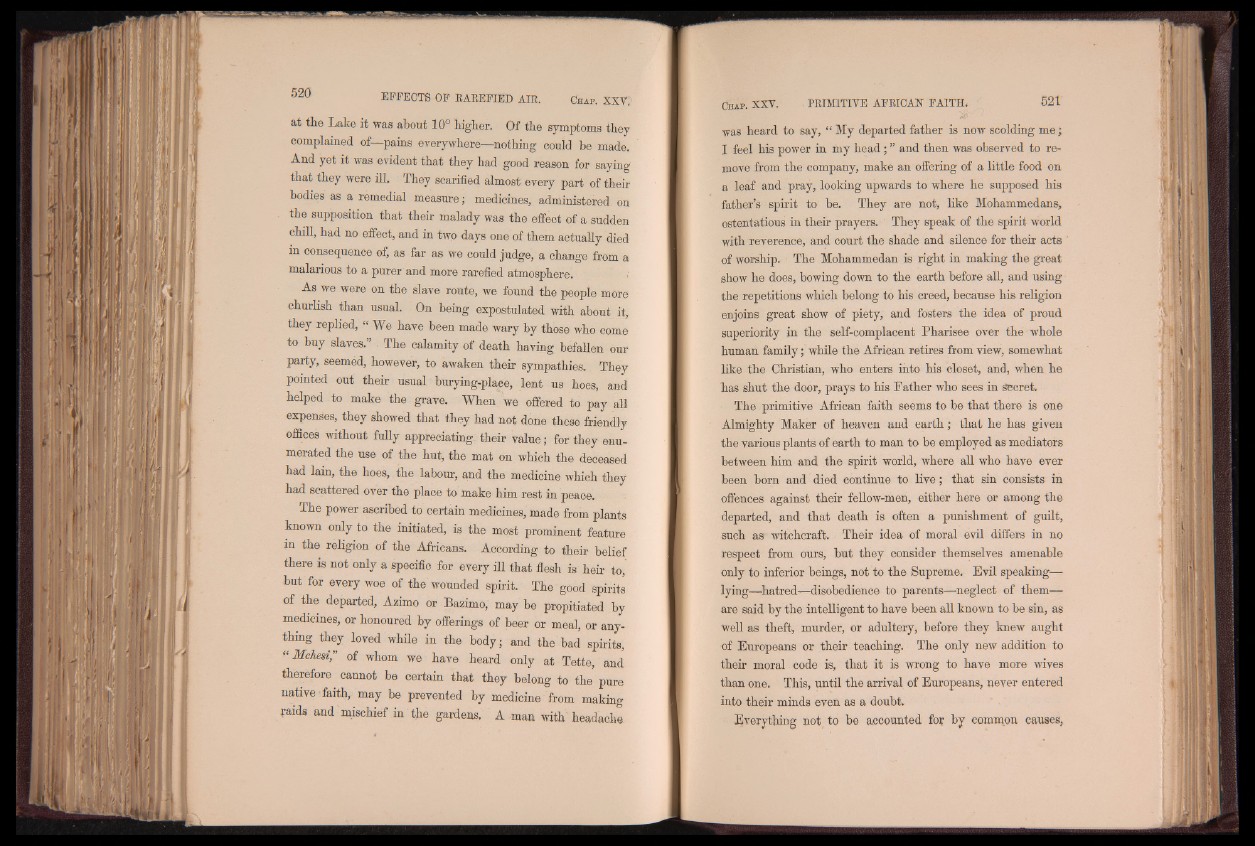
at the Lake it was about 10° higher. Of the symptoms they
complained of—pains everywhere—nothing could be made.
And yet it was evident that they had good reason for saying
that they were ill. They scarified almost every part of their
bodies as a remedial measure; medicines, administered on
the supposition that their malady was the effect of a sudden
chill, had no effect, and in two days one of them actually died
in consequence of, as far as we could judge, a change from a
malarious to a purer and more rarefied atmosphere.
As we were on the slave route, we found the people more
churlish than usual. On being expostulated with about it,
they replied, “ We have been made wary by those who come
to buy slaves.” The calamity of death having befallen our
party, seemed, however, to awaken their sympathies. They
pointed out their usual burying-plaee, lent us hoes, and
helped to make the grave. When we offered to pay all
expenses, they showed that they had not done these friendly
offices without fully appreciating their value; for they enumerated
the use of the hut, the mat on which the deceased
had lam, the hoes, the labour, and the medicine which they
had scattered over the place to make him rest in peace.
The power ascribed to certain medicines, made from plants
known only to the initiated, is the most prominent feature
in the religion of the Africans. According to their belief
there is not only a specific for every ill that flesh is heir to,
but for every woe of the wounded spirit. The good spirits
of the departed, Azimo or Bazimo, may be propitiated by
medicines, or honoured by offerings of beer or meal, or anything
they loved while in the body; and the bad spirits,
“ Mehed, of whom we have heard only at Tette, and
therefore cannot be certain that they belong to the’ pure
native faith, may be prevented by medicine from making
raids and mischief in the gardens. A man with headache
was heard to say, “ My departed father is now scolding me;
I feel his power in iny head; ” and then was observed to remove
from the company, make an offering of a little food on
a leaf and pray, looking upwards to where he supposed his
father’s spirit to be. They are not, like Mohammedans,
ostentatious in their prayers. They speak of the spirit world
with reverence, and court the shade and silence for their acts
of worship. The Mohammedan is right in making the great
show he does, bowing down to the earth before all, and using
the repetitions which belong to his creed, because his religion
enjoins great show of piety, and fosters the idea of proud
superiority in the self-complacent Pharisee over the whole
human family; while the African retires from view, somewhat
like the Christian, who enters into his closet, and, when he
has shut the door, prays to his Father who sees in secret.
The primitive African faith seems to be that there is one
Almighty Maker of heaven and earth; that he has given
the various plants of earth to man to be employed as mediators
between him and the spirit world, where all who have ever
been born and died continue to liv e; that sin consists in
offences against their fellow-men, either here or among the
departed, and that death is often a punishment of guilt,
such as witchcraft. Their idea of moral evil differs in no
respect from ours, but they consider themselves amenable
only to inferior beings, not to the Supreme. Evil speaking—
lying—hatred—disobedience to parents—neglect of them—
are said by the intelligent to have been all known to be sin, as
well as theft, murder, or adultery, before they knew aught
of Europeans or their teaching. The only new addition to
their moral code is, that it is wrong to have more wives
than one. This, until the arrival of Europeans, never entered
into their minds even as a doubt.
Everything not, to be accounted for by common causes,